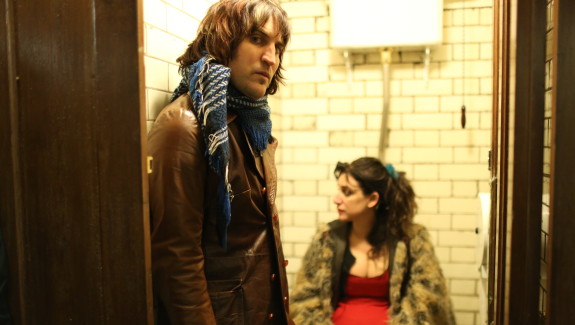For a tedious hour, screwed-up couples in screwed-up relationships fall apart; for an equally unenlightening half-hour denouement, the utterly mundane ways they came together are revealed. Mercedes Grower‘s directorial debut is essentially an eavesdrop on the kind of irritating personal conversations you can overhear in any pub on any night – mildly distracting, but with unloveable, self-regarding participants that make one despair for modern humanity. If it weren’t a “London” film, if its personnel weren’t so well connected, if instead these were dismal couples from Leicester falling out in a pub car park, this weak, inverted Love, Actually would never have been made, but might have had more to commend it.
We are introduced, slowly, to a multitude of couples in the death throes of romance. Shot on hand-held cameras, and ad-libbed for added realism, their partings are sullen, self-centred and unspectacular. Ordinary goodbyes of the “Is this it then? Is it over?” variety take place on Hampstead Heath train platform, on a city rooftop, in a penthouse apartment. Dialogue is bland and vague. By the time most of the couples come round a second time, you’ve forgotten they existed, and care even less.
Nothing in particular is resolved by showing the prequels to their break-ups either. The narrative arc is more a narrative flatline. Anyone who has ever been through a break-up, particularly with someone they should never have been with in the first place, may identify with what’s on show, but rather than stirring up a befuddling brew of mixed emotions, it will only remind you of how irredeemably annoying many break-ups are.
Worse, the Londoncentricity of the film is insufferable, and it’s Londoncentricity of a particularly narrow kind. These everymen and women work at the National Theatre, or are being sent to Paris Fashion Week for work, or run casting sessions at plush hotels. Even the hard-up boho types live in funky warehouseland rooftop squats. There’s little enough time to connect to the characters, but the likelihood of warming to them wouldn’t increase if we saw more. It’s hard to care that a rich, dull businessman has bored his martini-swilling partner into booking a Qantas flight away from him and the Mayfair flat, even if the businessman in question is Fine Young Cannibals’ Roland Gift in a half-decent, surly performance.
In fact, it’s in the sprawling, ticks-all-the-right-boxes cast that the film is partially redeemed. Mighty Boosh fans will lap up Julian Barratt and Noel Fielding‘s separate scenes, their offbeat relationships being the most engaging, and Julia Davis plays her usual deluded seductress in her usual sinister way, if you haven’t tired of that one-trick pony. But it’s the straight actors that have the biggest ameliorating effect. Paul McGann, in only two scenes, noticeably raises the game, and manages to inject a smidgen of intrigue into proceedings. His is the only character that’s not immediately and easily pinned down. Peter Wight makes a great Winner-ish director too, and Grower herself is pretty good.
But good acting can only do so much. Brakes is film-making at its most insular and self-serving. No-one involved seems to have considered that the tiny sphere of existence in which they find themselves might be anything less than fascinating. Realism is all well and good, but you’d get that, and more drama to boot, from your average episode of First Dates.


Comments